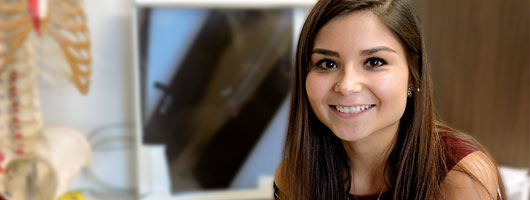 Pictured | Cassandra Gonzalez | Radiography | Bremen, Indiana (hometown)
Pictured | Cassandra Gonzalez | Radiography | Bremen, Indiana (hometown)
Radiography Program
The Radiography Program is a 34+ month program that prepares the radiography student to become a competent diagnostic radiographer. The clinical/professional program is presented in a full-time, day format, with minimal weekend and evening clinical education. The curriculum follows a pattern designed to educate the radiographer to become adept in the performance of any medical diagnostic radiographic procedure. Courses in radiographic principles, radiographic procedures, clinical application of theory, digital imaging, radiation protection, radiobiology, pathology, and general education are included in the curriculum. Students also receive instruction in the theory and practice of other specialty diagnostic imaging modalities.
Program facilities of the Radiography Program are located on the campus of IU South Bend. Clinical education classes are conducted in the radiology departments of area institutions: Beacon Medical Group Pediatrics, Bristol Street, Beacon Medical Group, Ireland Road, Beacon Medical Group, Lighthouse Imaging Main Street, Community Hospital of Bremen, Kosciusko Community Hospital, Memorial Hospital of South Bend, St. Joseph Regional Medical Center campuses in Plymouth and Mishawaka, Elkhart General Hospital, and IU Health Goshen Hospital.
Mission
The mission of the Radiography Program is to provide our students with a comprehensive education in Radiography to prepare them to become clinically competent radiographers who will conduct themselves in a professional manner during their practice of diagnostic radiography. The student will be acquainted with all available methods of instruction in clinical and didactic radiography, to include the cognitive (problem solving, critical thinking, and verbal and written communication), psychomotor, and affective domains. Upon graduation, the student is to be sufficiently prepared to successfully pass the American Registry of Radiologic Technologists certification examination.
Philosophy
The program is based on the belief that the student radiographer should experience as many forms of educational opportunity as possible in both the didactic and clinical setting as part of their student learning environment. In times of change in the healthcare field, the student needs to be given the necessary skills to adapt to constant change. It is our belief that general education course work in English composition, mathematics, human anatomy and physiology, public speaking, and medical terminology will enhance the abilities of the graduate technologist while the attainment of the associate degree will evaluate their professional status.
The program functions in partnership with the University and the medical facilities within the regionally served community. One part of this partnership involves on-site clinical education sites for our students. The second part involves the responsibility of the Radiography program to provide the community with clinically competent graduate radiographers who will model proper professional behaviors. The students, the community, and the University benefit in an environment of trust and cooperation between all involved parties.Program Goals
At the completion of the Radiography Program
- the student will graduate clinically competent.
- the student will be able to effectively communicate.
- the student will display critical thinking skills.
- the student will exhibit professional behaviors.
- the student will demonstrate service learning in the community.
Accreditation
The Radiography Program is accredited by the Joint Review Committee on Education in Radiologic Technology.
The Student’s Responsibility
All universities establish academic requirements that must be met before a degree is conferred. These regulations concern such things as curricula and courses, the requirements for majors and minors, and university procedures and policies. Each student is individually responsible for fulfilling them. Advisors and faculty are available to advise students on how to meet these requirements. If the requirements have not been satisfied, the degree will be withheld pending satisfactory fulfillment. For this reason, it is important for each student to be knowledgeable of all of the requirements described in this IU South Bend Undergraduate Bulletin and the AS in Radiography Program Handbook.
Students are expected to comply with the:
- Academic Regulations and Policies of Indiana University
- American Registry of Radiologic Technologists Code of Ethics
- Components of Professional Behavior of the IUSB Radiography Program
- Indiana University of South Bend Radiography Program Student Handbook
Code of Ethics
Students preparing to enter the profession of radiography are expected to follow the Code of Ethics for the Radiologic Technologist. Each person, upon entering the profession, inherits a measure of responsibility and trust in the profession and the corresponding obligation to adhere to standards of ethical practice and conduct set by the profession. The code was adopted by the American Society of Radiologic Technologists.
It is the clinical/professional student’s responsibility to know, understand, and follow the Code of Ethics for the Radiologic Technologist. Please see the Radiography Program Student Handbook for details of the Code of Ethics.
Graduates of the Program
Graduates receive an Associate of Science degree in radiography (ASR) and are eligible to take the certification examination of the American Registry of Radiologic Technologists (ARRT) to become certified as a Registered Technologist R.T. (R).
Indiana State Certification
Indiana State certification is required to operate a unit that produces ionizing radiation. The state accepts the ARRT registry for certification.